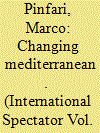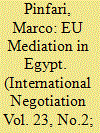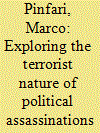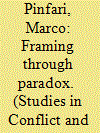| Srl | Item |
| 1 |
ID:
111551


|
|
|
|
|
| Publication |
2012.
|
| Summary/Abstract |
This article discusses the role played by the European Union, African Union and Arab League in the recent revolutions in Tunisia, Egypt and Libya. It focuses in particular on the use and impact of political and economic conditionality, the decision-making processes within each organisation and the inter-regional forums created to deal with the crisis. The analysis acknowledges the increasingly active and vocal role played by regional organisations in the so-called 'Arab spring', but it highlights not just that they had few legal powers to intervene in these crises, but also that they seemed very reluctant to use any form of political or economic conditionality. It also reveals that the main purpose of inter-regional forums was arguably not to generate consensus internationally but rather to manage dissent. As such, the article encourages a reflection on the specific challenges and opportunities that North Africa and the Mediterranean region pose to regional conflict management.
|
|
|
|
|
|
|
|
|
|
|
|
|
|
|
|
| 2 |
ID:
159776


|
|
|
|
|
| Summary/Abstract |
This article reviews EU’s mediation attempts in Egypt between 2011 and 2013. After presenting the main challenges and opportunities of EU mediation in the Middle East-North Africa (MENA) neighborhood, EU interventions in Egypt are discussed in relation to the 25 January 2011 revolution, during the presidency of Mohammed Morsi, and after the 3 July 2013 coup d’état, focusing specifically on the choice of mediation styles and their timing. It is argued that three contextual conditions that are typical of the crises that erupt during failed democratic transitions – their fast pace, their eminently domestic nature and significant power asymmetries between the main parties involved – exacerbate the structural problems that the EU faces when intervening in countries that are not current or potential candidates for accession. The analysis of EU mediation styles during Egypt’s transition provides a critical perspective on EU’s foreign policy making after the Treaty of Lisbon.
|
|
|
|
|
|
|
|
|
|
|
|
|
|
|
|
| 3 |
ID:
091269


|
|
|
|
|
| Publication |
2009.
|
| Summary/Abstract |
This paper reassesses the suggestion, advanced among others by David George, that the 1858 failed attentat by the Italian patriot Felice Orsini against Napoleon III can be considered as a paradigmatic instance of "terrorist assassination." Drawing on a new interpretation of the acts of Orsini's trial, the paper argues that Orsini's motivations were to a large degree "idiosyncratic"; however, it also discusses evidence suggesting that the significant collateral damage caused by the attack was, in Orsini's mind, one of the aims of the action and cannot be portrayed as unintended.
|
|
|
|
|
|
|
|
|
|
|
|
|
|
|
|
| 4 |
ID:
156151


|
|
|
|
|
| Summary/Abstract |
This article presents and analyzes the “Obama supports terrorism” campaign, which was launched in Egypt in late June 2013 and was instrumental to the framing of some Islamist groups as terrorist both before and after the 3 July 2013 coup. The analysis of the visual material of the campaign highlights its reliance on various Western discourses from the War on Terror, including some whose religious and racial content is an odd fit for a non-Western, Muslim country like Egypt. Yet, despite the lack of a clear and unified causal narrative to justify such framing, the success of the campaign was crucially aided by the symbolic and rhetorical power its slogan, which provided a credible “schema of interpretation” for its supporters.
|
|
|
|
|
|
|
|
|
|
|
|
|
|
|
|
| 5 |
ID:
107966


|
|
|
|
|
| Publication |
2011.
|
| Summary/Abstract |
This article explores the impact of time pressure on negotiation processes in territorial conflicts in the post-cold war era. While it is often argued that time pressure can help generate positive momentum in peace negotiations and help break deadlocks, extensive literature also suggests that perceived time shortage can have a negative impact on the cognitive processes involved in complex, intercultural negotiations. The analysis explores these hypotheses through a comparison of sixty-eight episodes of negotiation using fuzzy-set logic, a form of qualitative comparative analysis (QCA). The conclusions confirm that time pressure can, in certain circumstances, be associated with broad agreements but also that only low levels of time pressure or its absence are associated with durable settlements. The analysis also suggests that the negative effect of time pressure on negotiations is particularly relevant in the presence of complex decision making and when a broad range of debated issues is at stake.
|
|
|
|
|
|
|
|
|
|
|
|
|
|
|
|
| 6 |
ID:
112445


|
|
|